Tag Archives: STIREducation
Posted on February 23, 2016 by Sophie Hicks
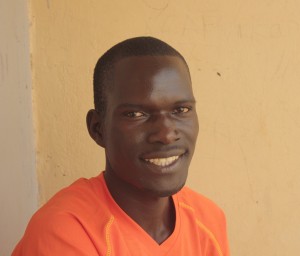
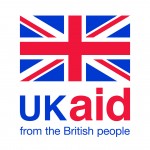
Sunday is only 22 years old, yet already he is the headteacher of Lacek Community School in Nwoya district! To hold such an important position at such a young age is testimony to both his considerable talents as a teacher and to how highly he is considered in the surrounding community. But Sunday is not just a Headteacher. He is also participating in the Teacher Changemaker network, which we coordinate in partnership with STIR Education in Northern Uganda! So far, Sunday has implemented an incredibly successful Village Savings and Loans Association in Lacek School (they have saved an impressive 3,775,400 since May) which is also helping to bring parents closer to the school to monitor their children’s education, improving student motivation and performance. Read on to discover how Sunday is changing the way the local community views education and impacting on the next generation at Lacek Community School!
My parents were escaping from the Lord’s Resistence Army, so I was born in Gulu. But our original homeland is in Kinene. We moved back to Kinene in 2006 when the war ended. I was 13 years old. I have only 3 brothers without any girls. My mother gave birth to 4 girls but they all passed away. There were only 4 boys left. I have four half brothers and sisters from my fathers second wife. We all live together in Kinene. My father had many wives, almost 11. He is 80 years old now.
Teaching became interesting to me because of a certain teacher in my primary, called Mr Laloo. That teacher really made me who I am. I struggled to learn English, so he put a lot of work into teaching me how to speak and write well. I liked the way he taught me, and I promised to myself I would become a teacher.
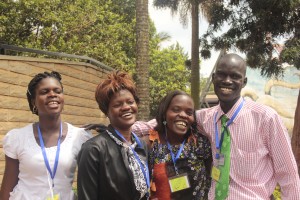 Being part of the Teacher Changemaker network made me realise that the problem in our schools is parent engagement. It touches me. There is a lack of parent engagement in these communities – parents have very negative attitudes towards education. I saw that many were not able to pay their children in school. I sat down with the School Management Committees and asked, which is the best way we can help these parents? I decided to bring the Village Savings and Loans Association (VSLA), which other localities are doing successfully. When they save money for 2 months, that money alone is able to pay the school fees for their children. So I decided to mobilize parents. Many parents joined me. Every week they come and save their money in the pool. So far they have saved 3,775,400 (since May 2015).
Being part of the Teacher Changemaker network made me realise that the problem in our schools is parent engagement. It touches me. There is a lack of parent engagement in these communities – parents have very negative attitudes towards education. I saw that many were not able to pay their children in school. I sat down with the School Management Committees and asked, which is the best way we can help these parents? I decided to bring the Village Savings and Loans Association (VSLA), which other localities are doing successfully. When they save money for 2 months, that money alone is able to pay the school fees for their children. So I decided to mobilize parents. Many parents joined me. Every week they come and save their money in the pool. So far they have saved 3,775,400 (since May 2015).
Children are getting benefits from their parents being in the VSLA. Their parents can borrow money and pay them, buy for them uniform, the scholastic materials. Also, the parents are able to monitor their children, whether they are in the class, whether they are learning. They first move around all the school compound checking what is wrong, what is good, and they feedback later.
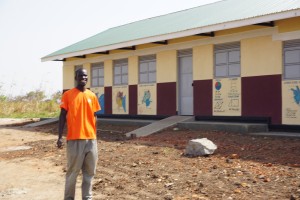 In our culture, when you are a teacher, people prefer to be like you, because teachers are able to make unknown known. So people take teachers as the most important thing for the community. The change makers. Whenever there are any problems they first consult the teacher. During village meetings, I am always the chief’s guest when they are making bylaws. I help them to decide which ways to manage the schools and build the community. And when we are making school rules, we invite the chiefs to help. So when the child is not at school, we can give a phone call to the chief to inform him about the problem within his area of service.
In our culture, when you are a teacher, people prefer to be like you, because teachers are able to make unknown known. So people take teachers as the most important thing for the community. The change makers. Whenever there are any problems they first consult the teacher. During village meetings, I am always the chief’s guest when they are making bylaws. I help them to decide which ways to manage the schools and build the community. And when we are making school rules, we invite the chiefs to help. So when the child is not at school, we can give a phone call to the chief to inform him about the problem within his area of service.
I am getting some great advice from the network, like its OK to make mistakes. For us we take mistakes as a very bad thing. When we make mistakes in the Ugandan education system, people do not like it. But when I see anyone making mistakes, I just help them, and do not tell them off. The network always tells us that through mistakes, you can learn.
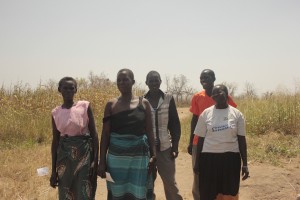 The part of the network that has motivated me a lot is friendship. Before, I didn’t know any of the other teachers in Nwoya district who are now in the network. I speak with my friend Gino (a pre-primary teacher at Purongo Hill Primary School) by phone almost daily. We just call each other and share the things from our day.
The part of the network that has motivated me a lot is friendship. Before, I didn’t know any of the other teachers in Nwoya district who are now in the network. I speak with my friend Gino (a pre-primary teacher at Purongo Hill Primary School) by phone almost daily. We just call each other and share the things from our day.
In the future, after going for my ECD diploma, I’m hoping to be a tutor and train teachers in Early Childhood Development. I can see myself so much specialised in the ECD because I understand young children’s behaviour.
My daughter, she is very stubborn! She is around 2 years old. At around 1 ½ years, she was also able to speak. She acquired language very early. I play with her everyday, even if she is not understanding everything I say. She is called Akello Charity Hope. She loves playing, she plays so much. When I reach home in the evening, we sing songs together. I will arrive and she will immediately come to me to sing songs, to speak funny things. In the future I want her to be like me – a teacher.
Posted in News |
Tagged Acholi, African Revival, Changemaker, Development, ECD, Education, endurance, Gulu, Headteacher, inspiration, International Development, Interview, Jumpstart!, Kampala, Nursery, Nursery School, Profile, Pupils, School, School Development, STIREducation, Teacher training, Uganda, World Teachers' Day |
Leave a comment
Posted on February 17, 2016 by Sophie Hicks
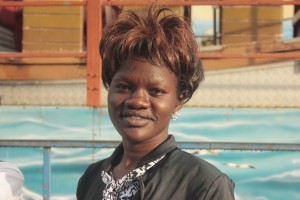

Irene started her early career as a tap dancer. Trained for a year by a man from California named Jack, she still has a real passion for the dance with ‘the glass shoes’. Now an Early Childhood Development teacher in Anaka P7 Primary School in Nwoya district, Northern Uganda, she regularly brings song and dance into her lessons as a way of energising her pupils and bringing her classroom alive. This interactive style of teaching is just one of the things she has learned from participating in Teacher Changemaker network, implemented by STIR Education and coordinated in Nwoya district by African Revival.
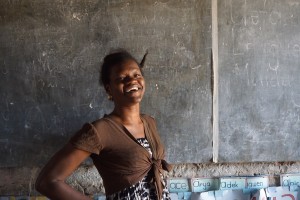 The Teacher Changemaker network encourages teachers across Uganda to introduce ‘micro innovations’, new techniques to increase the quality of education, into their lessons to respond to the challenges they face in the Ugandan education system. For Irene and her colleagues at Anaka P7, one of the main challenges is lack of parental engagement: “We decided that parental engagement is the biggest problem affecting our school. There are parents that, when you call them for a meeting, they don’t want to come. They don’t provide the scholastic materials for their children. You find a child will come to school hungry, without having eaten, and not be able to concentrate in class. Children like this end up failing.” She and her fellow teachers have introduced a procedure to counteract this challenge: “The first step is to call the parents for a meeting. The second stage is to go up to the home to see what is the problem stopping this child from performing. And the time comes when the parents start to listen, slowly, until they are now following the advice of the teacher. We have used this procedure and now there are many who come to check the progress of the children”. This micro innovation is already having positive results. This year, more children in Irene’s class passed, and she has noticed a change in the attitude of her students in class, now their parents are taking more of an interest in their education.
The Teacher Changemaker network encourages teachers across Uganda to introduce ‘micro innovations’, new techniques to increase the quality of education, into their lessons to respond to the challenges they face in the Ugandan education system. For Irene and her colleagues at Anaka P7, one of the main challenges is lack of parental engagement: “We decided that parental engagement is the biggest problem affecting our school. There are parents that, when you call them for a meeting, they don’t want to come. They don’t provide the scholastic materials for their children. You find a child will come to school hungry, without having eaten, and not be able to concentrate in class. Children like this end up failing.” She and her fellow teachers have introduced a procedure to counteract this challenge: “The first step is to call the parents for a meeting. The second stage is to go up to the home to see what is the problem stopping this child from performing. And the time comes when the parents start to listen, slowly, until they are now following the advice of the teacher. We have used this procedure and now there are many who come to check the progress of the children”. This micro innovation is already having positive results. This year, more children in Irene’s class passed, and she has noticed a change in the attitude of her students in class, now their parents are taking more of an interest in their education.
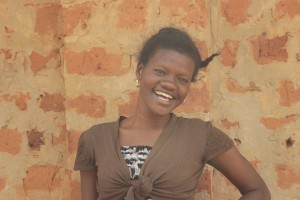 Irene is confident that the innovations and increased focus on critical analysis and problem solving that the Changemaker network has facilitated will continue to have a positive impact on her primary school: “as long as we keep innovations coming to Anaka p7, there will be a great many positive changes. Though we have some parents who don’t listen to the school, in time there will be a lot of improvements because us teachers have learned ways of solving the problems we face”
Irene is confident that the innovations and increased focus on critical analysis and problem solving that the Changemaker network has facilitated will continue to have a positive impact on her primary school: “as long as we keep innovations coming to Anaka p7, there will be a great many positive changes. Though we have some parents who don’t listen to the school, in time there will be a lot of improvements because us teachers have learned ways of solving the problems we face”
The network is also having a positive impact on Irene’s confidence and motivation as a teacher: “The network taught me that, if you are a teacher, you should have confidence in everything you do, you should be exemplary, you should have knowledge, you should be someone who searches for things that will make a change. Someone creative in the mind who will search for ways to make the children learn well and pass”.
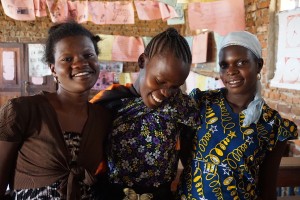 She also enjoys the unity and collaboration with the other Teacher Changemakers, which is a real advantage for all participants. Teaching in any part of the world can be a difficult job, and in Uganda the lack of good infrastructure, teaching materials and training exacerbates the already considerable challenges. By encouraging teachers to share and support each other, the Teacher Changemaker network is looking to alleviate these challenges through an informal support system that allows participants to vocalise their problems and search for solutions together. This style of network also means that innovations produced by the teachers are tailored to the specific localised environments across Uganda, rather than ready-made solutions designed out of context. This contributes to the success of the network and its popularity amongst its Changemakers, especially Irene, who advised teachers to try out the new Changemaker innovations for themselves: “My advice for other teachers is this: go and put the micro innovations into use, because they will help a lot. And help you learn how to communicate with others, discuss, be social and cooperative and many others. When you go back to school tell others to do the same!”
She also enjoys the unity and collaboration with the other Teacher Changemakers, which is a real advantage for all participants. Teaching in any part of the world can be a difficult job, and in Uganda the lack of good infrastructure, teaching materials and training exacerbates the already considerable challenges. By encouraging teachers to share and support each other, the Teacher Changemaker network is looking to alleviate these challenges through an informal support system that allows participants to vocalise their problems and search for solutions together. This style of network also means that innovations produced by the teachers are tailored to the specific localised environments across Uganda, rather than ready-made solutions designed out of context. This contributes to the success of the network and its popularity amongst its Changemakers, especially Irene, who advised teachers to try out the new Changemaker innovations for themselves: “My advice for other teachers is this: go and put the micro innovations into use, because they will help a lot. And help you learn how to communicate with others, discuss, be social and cooperative and many others. When you go back to school tell others to do the same!”
Posted in News |
Tagged Acholi, African Revival, Changemaker, Development, ECD, Education, inspiration, International Development, Jumpstart!, Kampala, Kilimanjaro, Nursery, Nursery School, Profile, Pupils, School, School Development, STIREducation, Teacher, Teacher training, Uganda |
Leave a comment
Posted on February 11, 2016 by Sophie Hicks
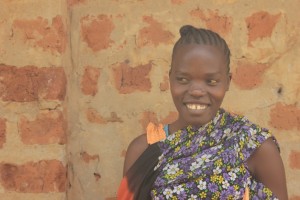 Kevin, aged 23, is a primary teacher from Anaka P7 Primary School, and a fantastic Teacher Changemaker! She is participating in STIR Education’s Teacher Changemaker network, which is designed for teachers to share ideas and innovations, as well as to provide a source of motivation for educators in what can be a difficult working environment. African Revival’s Jumpstart! team has been helping STIR to manage the network in Nwoya district, where we caught up with Kevin to find out how the Changemaker network is benefitting her and her students!
Kevin, aged 23, is a primary teacher from Anaka P7 Primary School, and a fantastic Teacher Changemaker! She is participating in STIR Education’s Teacher Changemaker network, which is designed for teachers to share ideas and innovations, as well as to provide a source of motivation for educators in what can be a difficult working environment. African Revival’s Jumpstart! team has been helping STIR to manage the network in Nwoya district, where we caught up with Kevin to find out how the Changemaker network is benefitting her and her students!
I teach in the primary section of Anaka P7. I like the lower primary classes because they are young and friendly, so I enjoy interacting with them. The Teacher Changemaker network has given me a lot of methods about how to handle children, especially children with behavioural problems. It has given me more skills to handle the stubborn ones, the latecomers, and others with different problems.
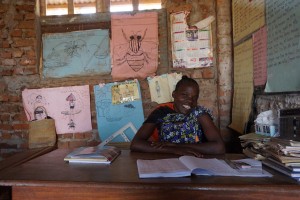 The best thing about being part of the Teacher Changemaker network is that we meet many Changemakers who give us many new skills. I have learnt the qualities of a good teacher, how to handle the classroom situation and how to make the classroom into a good learning environment.
The best thing about being part of the Teacher Changemaker network is that we meet many Changemakers who give us many new skills. I have learnt the qualities of a good teacher, how to handle the classroom situation and how to make the classroom into a good learning environment.
Being a Changemaker means being a teacher who is an all rounder, being a teacher who has a growth mind-set not a fixed mind-set and a teacher who is always ready for anything. As a Changemaker, you have to practice what you preach. You have to be innovative, influential, creative and motivate the learners.
This year I will use one micro innovation that I call ‘I do, we do, you do’. I will first do on my own as the learners watch and learn from me. Then ‘we do’ together. Then ‘you do’ – one particular learner will do as I observe and correct the work. We had some training about this. I’ve tried it before and it always works very well. Even during our teacher training, we do the exercises like this and it’s a nice technique.
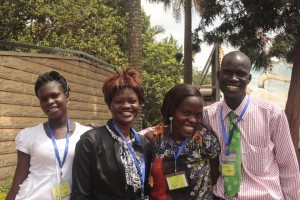 Since being involved in the Teacher Changemaker network, I have one success story about a child who didn’t enjoy learning. The child came from a long distance away, so the problem was lack of lunch, because at school we don’t provide food for the learners. I decided to talk to the parents of the child to make a plan. I started by advising them that in life there is mostly one thing: if the stomach is full, the brain will be open to learning new things, but if the stomach is complaining, the brain is focused on the stomach. The parents followed my advice and sent the child to school with packed lunch. Soon after, the learning behaviour of the child changed – they came to school early and concentrated in class. When the year ended last year, the child passed very well. After I saw the positive progress of the child, I told my fellow Changemakers in my school about the procedure I had used.
Since being involved in the Teacher Changemaker network, I have one success story about a child who didn’t enjoy learning. The child came from a long distance away, so the problem was lack of lunch, because at school we don’t provide food for the learners. I decided to talk to the parents of the child to make a plan. I started by advising them that in life there is mostly one thing: if the stomach is full, the brain will be open to learning new things, but if the stomach is complaining, the brain is focused on the stomach. The parents followed my advice and sent the child to school with packed lunch. Soon after, the learning behaviour of the child changed – they came to school early and concentrated in class. When the year ended last year, the child passed very well. After I saw the positive progress of the child, I told my fellow Changemakers in my school about the procedure I had used.
The happiest moment I have ever had is when I graduated from teaching college. I found that during my school practice I got an A! I celebrated this moment, because it’s the moment I became a qualified teacher.
I want to go to the next level of education. I want to do a degree in primary education. If I can, I’ll try East African International University in Kampala where this year’s STIR Education summit was held. I will work very hard to achieve this goal.
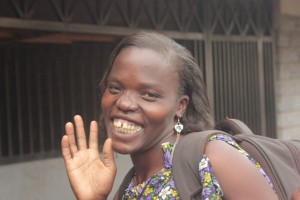 My role model is my dad because he is a teacher, so I’ve also decided to take his profession. He is a head teacher in St.Luke’s Primary School in Nwoya district. I always look at what he does and admire him because he is funny, friendly and nice.
My role model is my dad because he is a teacher, so I’ve also decided to take his profession. He is a head teacher in St.Luke’s Primary School in Nwoya district. I always look at what he does and admire him because he is funny, friendly and nice.
If I could give one piece of advice to a group of people it would be to be comfortable with change. They should not be static. If change comes, they should be open to new things. Like if a new teaching innovation is introduced we should embrace it.
Posted in News |
Tagged African Revival, Changemaker, Development, ECD, Education, Gulu, inspiration, International Development, Jumpstart!, Kampala, Nursery School, School Development, STIREducation, Teacher, Teacher training, Uganda |
Leave a comment
Posted on February 3, 2016 by Sophie Hicks
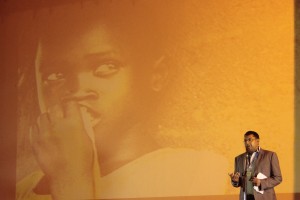 Elijah (pictured left) was the first boy in his village in rural Uganda to go to school. But seven years later, on the last day of Primary School, Elijah was unable to write a paragraph, read anything more than the simplest of sentences, or add and subtract. His father, dismayed that his son had failed so dramatically, walked to the school to visit the teacher and demand some answers. He said, “you failed me and you failed my son. I thought his life would be better than mine if he had an education”. And the teacher replied, “the son of a donkey will always be a donkey”.
Elijah (pictured left) was the first boy in his village in rural Uganda to go to school. But seven years later, on the last day of Primary School, Elijah was unable to write a paragraph, read anything more than the simplest of sentences, or add and subtract. His father, dismayed that his son had failed so dramatically, walked to the school to visit the teacher and demand some answers. He said, “you failed me and you failed my son. I thought his life would be better than mine if he had an education”. And the teacher replied, “the son of a donkey will always be a donkey”.
Such bad teachers are of course an anomaly in Uganda. But this story is a reflection of a problem facing many children across the world: lack of quality education in the classroom that leads to many pupils leaving primary school without being able to read, write or solve a simple mathematical problem. Quality education was also set as one of the new Sustainable Development Goals by the United Nations, who have identified that, although the number of children going to school has increased, levels of literacy levels in many countries have actually deteriorated.
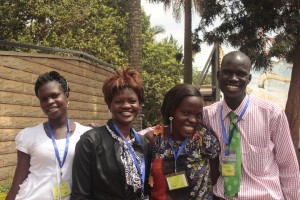 It is this problem that the Teacher Changemaker network in Uganda, led by STIR Education, aims to address. The network is designed for teachers to share ideas and innovations, as well as to provide a source of motivation for participants in what can be a difficult working environment. African Revival’s Jumpstart! team has been helping STIR to manage the network in Nwoya district, and recently accompanied 28 Teacher Changemakers to the annual STIR network summit in Kampala. Held in the ‘Wonderland’ complex in the grounds of the International University of East Africa, over 1,000 teachers attended the summit to receive certificates attesting to their hard work as Changemakers and to listen to talks by several keynote speakers, including government representatives from the Ministry of Education and Ugandan motivational speaker Fagil Musa Mandy.
It is this problem that the Teacher Changemaker network in Uganda, led by STIR Education, aims to address. The network is designed for teachers to share ideas and innovations, as well as to provide a source of motivation for participants in what can be a difficult working environment. African Revival’s Jumpstart! team has been helping STIR to manage the network in Nwoya district, and recently accompanied 28 Teacher Changemakers to the annual STIR network summit in Kampala. Held in the ‘Wonderland’ complex in the grounds of the International University of East Africa, over 1,000 teachers attended the summit to receive certificates attesting to their hard work as Changemakers and to listen to talks by several keynote speakers, including government representatives from the Ministry of Education and Ugandan motivational speaker Fagil Musa Mandy.
The speeches on the day were varied and inspiring. Many of the speakers focused on the characteristics of a Changemaker, highlighting that change first starts with the individual and that the teachers must make an effort to foster qualities such as discipline and efficiency in themselves as a prelude to change in the classroom. The Commissioner of Private Education emphasised the necessity of good habits: “If you want to be change agents, you must change yourselves first. Make it a habit that whatever God has given you to do, you do it with all your heart, all of your strength and all of your love. Learn to have good habits of time management, of working, of not missing classes.”
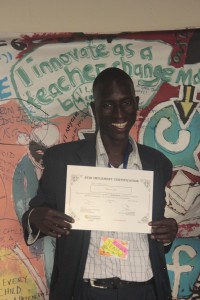
Gino (right), a nursery teacher from Purongo Hill Primary School in Nwoya district, reaffirmed this lesson after the conference: “The change begins with me the teacher. If I want to teach others, I really must have the courage to identify where my own weaknesses are, so I can begin a new journey of growth as both an individual, and an educator”
There was also an emphasis on rebranding the role of the teacher. In Uganda, the teaching profession has lost its prestige and is considered by many an undesirable role due to the meagre salary and often isolated posts in rural schools. But STIR wants to challenge the negative perceptions of educators and promote teaching as a noble, valuable profession – and teachers as powerful agents of change.
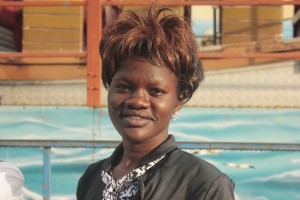 The summit was a perfect opportunity to reaffirm the values of the network and celebrate the hard work of the participating teachers to instigate change in their schools and communities. The Teacher Changemaker network encourages teachers to identify problems in their school and create ‘micro-innovations’ to address them – in collaboration with their fellow Changemakers, with whom participants can share, discuss and analyse ideas. Irene (left), a nursery teacher from Anaka Primary School explains the process: “One of us may ask, ‘what can we do to help this child’. So we sit down and share together, and discuss what we should do? Everyone contributes their opinion and then we put the ideas together and work hand in hand to reach a solution. We first discuss, then problem solve.”
The summit was a perfect opportunity to reaffirm the values of the network and celebrate the hard work of the participating teachers to instigate change in their schools and communities. The Teacher Changemaker network encourages teachers to identify problems in their school and create ‘micro-innovations’ to address them – in collaboration with their fellow Changemakers, with whom participants can share, discuss and analyse ideas. Irene (left), a nursery teacher from Anaka Primary School explains the process: “One of us may ask, ‘what can we do to help this child’. So we sit down and share together, and discuss what we should do? Everyone contributes their opinion and then we put the ideas together and work hand in hand to reach a solution. We first discuss, then problem solve.”
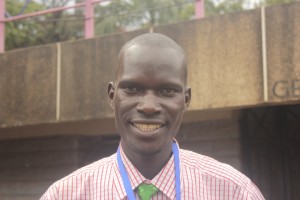 Sunday (right), a 22 year-old teacher from Lacek Primary School in Nwoya district, identified his pupils’ home environment as a major obstacle to learning. Sometimes parents show little interest in their children’s education and do not save the necessary funds to pay school fees and purchase scholastic materials. So Sunday decided to start a Village Savings and Loans Association (VSLA) for the parents: “My micro-innovation is that I am bringing parents closer to my school through a Village Savings and Loans Association. They come and save money together, and also monitor their children in class, which helps to improve educational performance.”
Sunday (right), a 22 year-old teacher from Lacek Primary School in Nwoya district, identified his pupils’ home environment as a major obstacle to learning. Sometimes parents show little interest in their children’s education and do not save the necessary funds to pay school fees and purchase scholastic materials. So Sunday decided to start a Village Savings and Loans Association (VSLA) for the parents: “My micro-innovation is that I am bringing parents closer to my school through a Village Savings and Loans Association. They come and save money together, and also monitor their children in class, which helps to improve educational performance.”
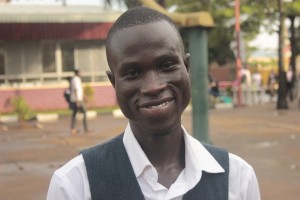 The network also encourages participation from local leaders, working across the system and targeting different layers of society to ensure that the approach is holistic, inclusive and instigates change at every level. Without ‘permission to innovate’ from parents and district officials, STIR Education CEO Sharath Jeevan acknowledged that their approach may not be effective. Stephen, a teacher from Nwoya central agreed: “Improving a child’s learning is not the responsibility of only one person. It is for all stakeholders, like the local leaders, the parents, the teachers and everybody in the community.”
The network also encourages participation from local leaders, working across the system and targeting different layers of society to ensure that the approach is holistic, inclusive and instigates change at every level. Without ‘permission to innovate’ from parents and district officials, STIR Education CEO Sharath Jeevan acknowledged that their approach may not be effective. Stephen, a teacher from Nwoya central agreed: “Improving a child’s learning is not the responsibility of only one person. It is for all stakeholders, like the local leaders, the parents, the teachers and everybody in the community.”
However the purpose of the summit in Kampala was primarily to celebrate the efforts of the teachers themselves to bring quality education to the classroom. Fagil Musa Mandy encapsulated their importance to Uganda perfectly in his powerful speech, when he said: “It is teachers who help to make the child’s dream clearer and let it grow. The only profession that opens hearts and makes them grow into flowers is the teacher”.
Posted in News |
Tagged Africa, African Revival, Changemaker, Education, Gulu, inspiration, International Development, Jumpstart!, Kampala, STIREducation, Uganda |
Leave a comment
 Being part of the Teacher Changemaker network made me realise that the problem in our schools is parent engagement. It touches me. There is a lack of parent engagement in these communities – parents have very negative attitudes towards education. I saw that many were not able to pay their children in school. I sat down with the School Management Committees and asked, which is the best way we can help these parents? I decided to bring the Village Savings and Loans Association (VSLA), which other localities are doing successfully. When they save money for 2 months, that money alone is able to pay the school fees for their children. So I decided to mobilize parents. Many parents joined me. Every week they come and save their money in the pool. So far they have saved 3,775,400 (since May 2015).
Being part of the Teacher Changemaker network made me realise that the problem in our schools is parent engagement. It touches me. There is a lack of parent engagement in these communities – parents have very negative attitudes towards education. I saw that many were not able to pay their children in school. I sat down with the School Management Committees and asked, which is the best way we can help these parents? I decided to bring the Village Savings and Loans Association (VSLA), which other localities are doing successfully. When they save money for 2 months, that money alone is able to pay the school fees for their children. So I decided to mobilize parents. Many parents joined me. Every week they come and save their money in the pool. So far they have saved 3,775,400 (since May 2015). In our culture, when you are a teacher, people prefer to be like you, because teachers are able to make unknown known. So people take teachers as the most important thing for the community. The change makers. Whenever there are any problems they first consult the teacher. During village meetings, I am always the chief’s guest when they are making bylaws. I help them to decide which ways to manage the schools and build the community. And when we are making school rules, we invite the chiefs to help. So when the child is not at school, we can give a phone call to the chief to inform him about the problem within his area of service.
In our culture, when you are a teacher, people prefer to be like you, because teachers are able to make unknown known. So people take teachers as the most important thing for the community. The change makers. Whenever there are any problems they first consult the teacher. During village meetings, I am always the chief’s guest when they are making bylaws. I help them to decide which ways to manage the schools and build the community. And when we are making school rules, we invite the chiefs to help. So when the child is not at school, we can give a phone call to the chief to inform him about the problem within his area of service. The part of the network that has motivated me a lot is friendship. Before, I didn’t know any of the other teachers in Nwoya district who are now in the network. I speak with my friend Gino (a pre-primary teacher at Purongo Hill Primary School) by phone almost daily. We just call each other and share the things from our day.
The part of the network that has motivated me a lot is friendship. Before, I didn’t know any of the other teachers in Nwoya district who are now in the network. I speak with my friend Gino (a pre-primary teacher at Purongo Hill Primary School) by phone almost daily. We just call each other and share the things from our day.















